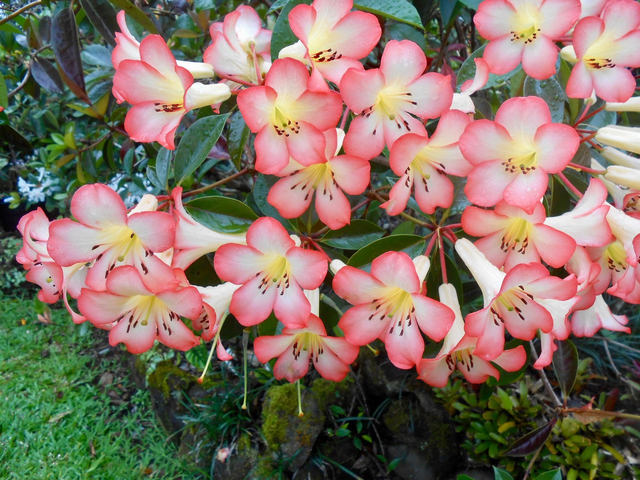This coming weekend is one of fun art and garden events you won’t want to miss. According to KT Cannon-Eger, Friends of Liliuokalani Gardens is encouraging folks to come to the Banyan Drive Art Stroll. It will be happening Saturday,
This coming weekend is one of fun art and garden events you won’t want to miss. According to KT Cannon-Eger, Friends of Liliuokalani Gardens is encouraging folks to come to the Banyan Drive Art Stroll. It will be happening Saturday, Jan. 14, from noon to 6 p.m. There will be all sorts of arts and crafts available. Entertainment will include Taiko drumming and island music. On Saturday, Jan. 28, from 8 a.m. to noon, you may want to get involved in the volunteer program to help clean up the gardens.
The Hawaii Chapter of the American Rhododendron Society is inviting all folks interested in learning how to grow tropical Rhododendrons to their Sunday, Jan. 15, meeting at the Keeau Community Center. The meeting starts with a potluck lunch at noon. Chapter president, Sherla Bertelmann, will share some tips on growing these interesting and colorful plants. Guest speaker will be Ken Goodrich, photographer. He has cooperated with Mitch Mitchell to produce a beautiful book, “Kimalia,” with photos of the many wonderful tropical rhododendrons available to Hawaiian gardeners. To encourage interest in tropical vireya rhododendrons, newcomers will likely be given a plant to take home. It is guaranteed that you will fall in love with this unusual group of plants if you haven’t already. According to Bertelmann, a hybrid named “Veronica Maureen” is being submitted for vireya of the Year 2017. It performs very well in Hawaii. She also mentioned many new hybrids here come from seed.
It is uncommon to find vireyas at our local nurseries, so by getting involved in the local chapter, you can obtain all kinds of new ones to enjoy.
Vireyas come from tropical Asia and are well known for their beautiful flowers that may vary in size from 1/2 inch to 5 inches across. Some are fragrant. Colors vary from white, yellow, pink, orange and red. Like hibiscus, each flower may be multicolored. The plants vary from shrubs to small trees and grow in a variety of environments. Some species grow in well drained soils and others will grow as epiphytes along with orchids. Some are lithophytes. That is, they grow on rocks with mosses and ferns. In Hawaii, they are well suited for our porous rocky lava soils with high humidity and rainfall. A good opportunity to see some major plantings is to visit the Panaewa zoo in Hilo. The society members have planted a beautiful display garden there.
One of the main goals of the Rhododendron Society is to protect endangered species, since so many come from fast disappearing rainforests and cloud forests.
With climate change and pressures of human population, even the vast forests of New Guinea, Borneo, peninsular Malaysia, Indonesia and the Philippines as well as the Himalayas, are being lost. By growing vireyas in our gardens, we are helping to save them from extinction. Another advantage is that they are very easy to grow as long as you give them good soil drainage. There are some tricks to help them do their best, but these are easily learned from other vireya lovers.
For more information on the meeting and the society, call Bertelmann at 966-9225.
I first fell in love with this amazing group of plants while climbing Mt. Kinabalu in Borneo. We were at about 7,000 feet elevation as the sun was about to set. The forest was ablaze in bloom with oranges and reds of vireyas growing as epiphytes on the gigantic ancient trees of the mountain. It has only been recently that I have seen the gardens of some of the society members who have incorporated vireyas into their landscape design. The riot of colors added to the lush gardens of East Hawaii and mauka West Hawaii is every bit as beautiful as one can see in the natural habitat of this amazing plant family.



